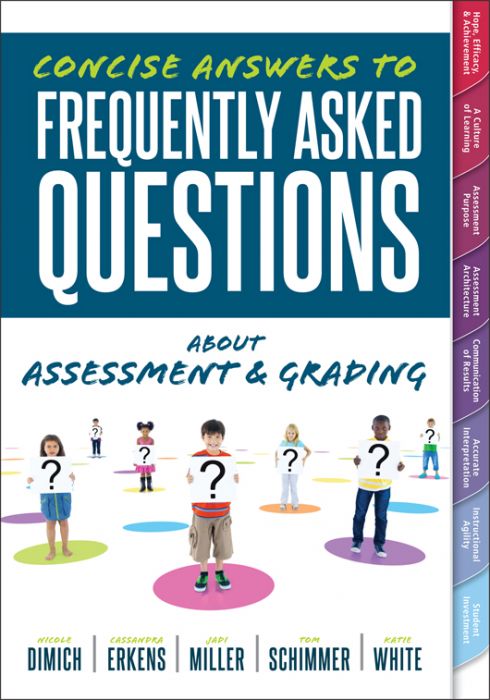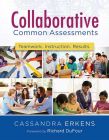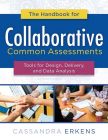
Concise Answers to Frequently Asked Questions about Assessment and Grading
If you have ever asked, “what are the best practices in grading and assessment?” then look no further. Your most challenging questions are answered through this FAQ dialogue that covers how to implement effective and strong assessment practices quickly and easily.
Add this eBook to your credit card purchase and gain immediate access.
eBooks are available on desktop, Android, and iOS via Adobe Digital Editions. eBook purchases are limited to one eBook per title, per account. Please visit the eBook FAQ for more information.
Use this guide to solve your most challenging questions about how to effectively implement assessment and grading
Get answers to your most challenging questions about implementing effective assessment and grading practices. How do we use assessments to increase hope, efficacy, and achievement? Is reassessment important? Can we change grading practices when stakeholders don’t want us to? All of these questions, and dozens more, are answered concisely, making it easy to build strong assessment and grading practices quickly.
K–12 teachers and administrators will:
- Understand the six tenets of assessment and grading.
- Gain confidence in effective assessment and grading practices.
- Access concise answers to common questions about assessment and grading.
- Help implement schoolwide best practices through effective collaboration.
Related Topics
Additional Information
“Assessment continues to be a topic of great debate among educators. Concise Answers to Frequently Asked Questions About Assessment and Grading breaks down the process piece by piece and then builds it back into a meaningful system that shifts assessment from being the end part of a student’s educational journey to an ongoing process that drives next steps.”
“The authors of Concise Answers to Frequently Asked Questions About Assessment and Grading . . . view assessment through the lenses of hope, efficacy, and achievement within an authentic culture of learning. They emphasize moving learning forward and allowing students to have ownership and agency by providing opportunities for self-assessment and goal setting. . . . This affective approach—understanding that assessment can be nurturing and caring—is something all educators need right now.”
When can I access my eBook? Your eBook will be accessible through VitalSource once your payment has been processed.*
*When using a check or purchase order, the order submitted online will not be processed until Solution Tree receives the check or a copy of the signed official purchase order. Your purchase order must note payment terms of net 30 days. We cannot process purchase orders that do not note these payment terms. Please submit all payments to [email protected].
How do I access my eBook?
To access your eBook:
- Create a free VitalSource account by visiting VitalSource.com. If you already have a VitalSource account, please log in to your account.
- Paste the redemption code that Solution Tree will email you in the “Redemption Code” field on VitalSource.com/Redeem. (Note: You can also access your redemption code within your Solution Tree account under the “eBook” section.)
- Click “Redeem.”
- Enjoy! Once your code is redeemed, your book will be added to your VitalSource Bookshelf and can be read anytime, anywhere.
What are the technical requirements for accessing the eBook? A VitalSource account is required. To sign up for your free account, please visit VitalSource.com.
What if I have trouble accessing my eBook? Please contact VitalSource by emailing [email protected] or by utilizing their Live Chat feature.
What are the shipping and handling costs? There are no shipping or handling costs associated with eBooks. For paperback and hardcover book purchases, standard shipping costs apply. Please visit the Product Orders page for more information on shipping and handling costs.
Can I purchase multiple copies of the same eBook? Bulk orders are not currently available through the website. Website purchases are limited to one eBook per title, per account. If you want to order multiple copies of an eBook, please contact customer support at [email protected].
What if I need to request a refund on my eBook order? RETURN POLICY: We are unable to accept returns or cancel previously placed eBook orders.






